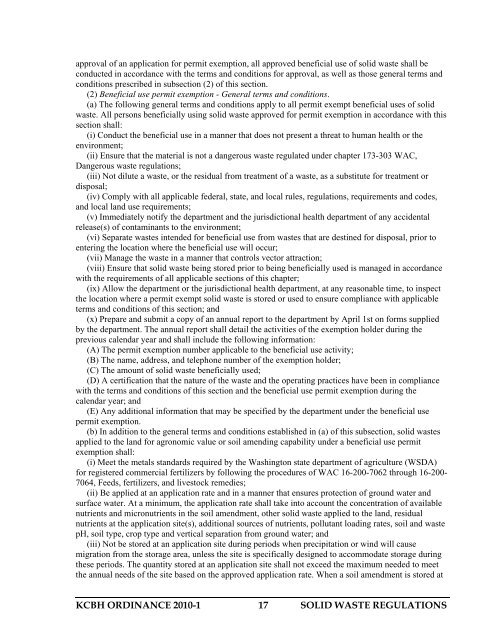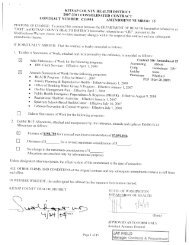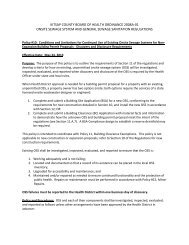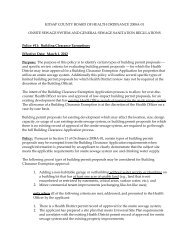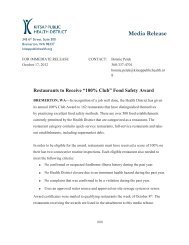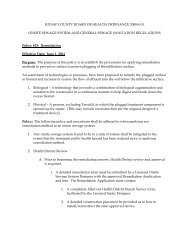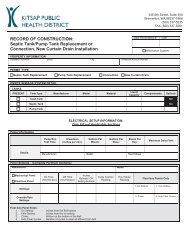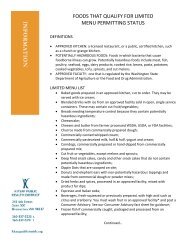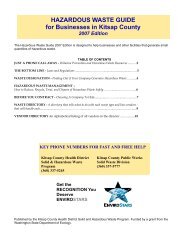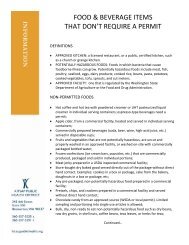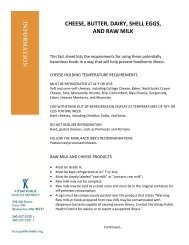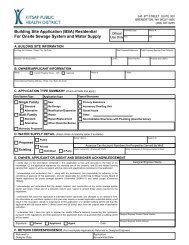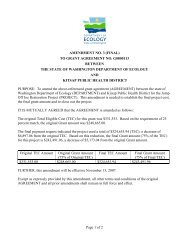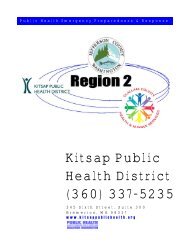SOLID WASTE REGULATIONS - Kitsap Public Health District
SOLID WASTE REGULATIONS - Kitsap Public Health District
SOLID WASTE REGULATIONS - Kitsap Public Health District
Create successful ePaper yourself
Turn your PDF publications into a flip-book with our unique Google optimized e-Paper software.
approval of an application for permit exemption, all approved beneficial use of solid waste shall be<br />
conducted in accordance with the terms and conditions for approval, as well as those general terms and<br />
conditions prescribed in subsection (2) of this section.<br />
(2) Beneficial use permit exemption - General terms and conditions.<br />
(a) The following general terms and conditions apply to all permit exempt beneficial uses of solid<br />
waste. All persons beneficially using solid waste approved for permit exemption in accordance with this<br />
section shall:<br />
(i) Conduct the beneficial use in a manner that does not present a threat to human health or the<br />
environment;<br />
(ii) Ensure that the material is not a dangerous waste regulated under chapter 173-303 WAC,<br />
Dangerous waste regulations;<br />
(iii) Not dilute a waste, or the residual from treatment of a waste, as a substitute for treatment or<br />
disposal;<br />
(iv) Comply with all applicable federal, state, and local rules, regulations, requirements and codes,<br />
and local land use requirements;<br />
(v) Immediately notify the department and the jurisdictional health department of any accidental<br />
release(s) of contaminants to the environment;<br />
(vi) Separate wastes intended for beneficial use from wastes that are destined for disposal, prior to<br />
entering the location where the beneficial use will occur;<br />
(vii) Manage the waste in a manner that controls vector attraction;<br />
(viii) Ensure that solid waste being stored prior to being beneficially used is managed in accordance<br />
with the requirements of all applicable sections of this chapter;<br />
(ix) Allow the department or the jurisdictional health department, at any reasonable time, to inspect<br />
the location where a permit exempt solid waste is stored or used to ensure compliance with applicable<br />
terms and conditions of this section; and<br />
(x) Prepare and submit a copy of an annual report to the department by April 1st on forms supplied<br />
by the department. The annual report shall detail the activities of the exemption holder during the<br />
previous calendar year and shall include the following information:<br />
(A) The permit exemption number applicable to the beneficial use activity;<br />
(B) The name, address, and telephone number of the exemption holder;<br />
(C) The amount of solid waste beneficially used;<br />
(D) A certification that the nature of the waste and the operating practices have been in compliance<br />
with the terms and conditions of this section and the beneficial use permit exemption during the<br />
calendar year; and<br />
(E) Any additional information that may be specified by the department under the beneficial use<br />
permit exemption.<br />
(b) In addition to the general terms and conditions established in (a) of this subsection, solid wastes<br />
applied to the land for agronomic value or soil amending capability under a beneficial use permit<br />
exemption shall:<br />
(i) Meet the metals standards required by the Washington state department of agriculture (WSDA)<br />
for registered commercial fertilizers by following the procedures of WAC 16-200-7062 through 16-200-<br />
7064, Feeds, fertilizers, and livestock remedies;<br />
(ii) Be applied at an application rate and in a manner that ensures protection of ground water and<br />
surface water. At a minimum, the application rate shall take into account the concentration of available<br />
nutrients and micronutrients in the soil amendment, other solid waste applied to the land, residual<br />
nutrients at the application site(s), additional sources of nutrients, pollutant loading rates, soil and waste<br />
pH, soil type, crop type and vertical separation from ground water; and<br />
(iii) Not be stored at an application site during periods when precipitation or wind will cause<br />
migration from the storage area, unless the site is specifically designed to accommodate storage during<br />
these periods. The quantity stored at an application site shall not exceed the maximum needed to meet<br />
the annual needs of the site based on the approved application rate. When a soil amendment is stored at<br />
KCBH ORDINANCE 2010-1 17 <strong>SOLID</strong> <strong>WASTE</strong> <strong>REGULATIONS</strong>


